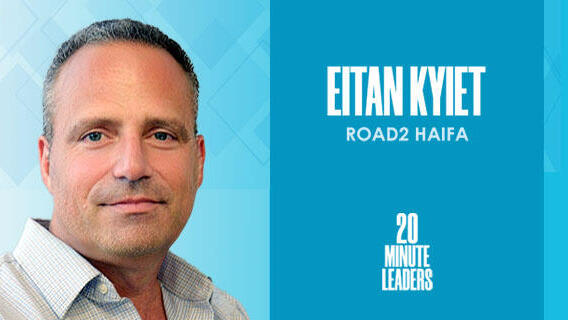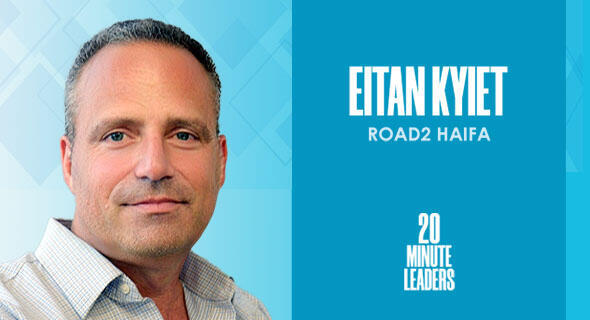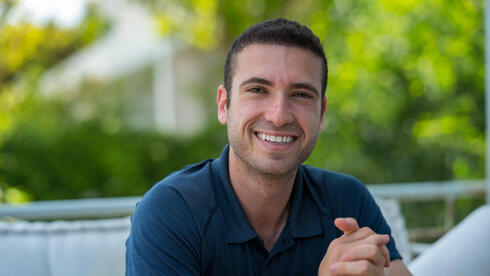
20-Minute Leaders
“The engine that we created, based on the needs of the corporates, really works.”
Investing isn’t work for Eitan Kyiet, CEO of Road2 Haifa and principal at Friendly Angels Club. It is a labor of love that he undertakes alongside his career.
Investing isn’t work for Eitan Kyiet, CEO of Road2 Haifa and principal at Friendly Angels Club. It is a labor of love that he undertakes alongside his career. He spent time as an M&A lawyer before switching to business roles in corporates and a startup. These experiences brought him to Road2 Haifa, where his goal is to bring corporations and startups together in the north of Israel. Instead of beginning with the startups, Kyiet says their strategy is to find out from corporates where they are not doing very well and then find startups who can help. He explains that the success of many of Road2’s startups shows that this model works well. Through partnerships and collaboration, many different players in the Haifa area have an interest in Road2’s success. Kyiet says Israel’s high-tech industry actually began in Haifa, and he wants to help the area’s ecosystem to grow.
Click Here For More 20MinuteLeaders
Tell me about Haifa and about your own relationship with it.
It started at the age of 13, when my family immigrated from the UK and decided that Haifa is the perfect place to be. A wonderful combination between hills, forests, beaches, and great weather and wonderful people. I have stayed in Haifa more or less; I still live here.
Why do you feel that way?
The atmosphere is a lot more laid back than Tel Aviv. The education is wonderful. People are a lot friendlier. It's just a great place, in my opinion, to create and grow businesses. It's a little known fact that Israeli high-tech was actually born in Haifa. Over the years it migrated more to the center of Israel. But still, Haifa boasts the biggest industry park in Israel for high-tech, and several multinationals have their home here, at least their development home in Israel. Another advantage is that a lot of the heavy industry of Israel is located in the Haifa Bay, which creates more opportunities on the industry 4.0 side, and a lot of collaboration happens.
Tell me about your background leading into what you do today with Road2 Haifa.
I started out in a totally different realm. I was trained as an M&A lawyer, and I did that for 15 years in some major defense groups in Israel and some investment groups. Later on when I became mainly a high-tech lawyer in a law firm in Tel Aviv, my main business was M&As, IPOs, NASDAQ: that's all I did for about 15 years until I decided that I really want to step into business.
I really love the issue of investments. I don't consider it as a job; it's something that I do out of love. That's when I established Friendly Angels Club with a partner from Belgium who was also living in Haifa. We met on the train. Over the past 16 years or so, we've invested significant sums from investors from all across the globe who were in love with the story of Israel. Because it was our own money, we were very selective in our investment strategy. Out of 15 total investments that we made, we only had to write off three companies. Out of the remainder, we had five exits: two IPOs, one reverse merged, two M&As. All of the rest are doing very well. That we considered as a labor of love.
But as a career, I also had to earn my living, and I chose to do that on the corporate side, starting in medical lasers with Lumenis, for several years there doing a lot of very operational roles. I ended up doing their internal M&As and investments. I was headhunted then to a company from the Johnson and Johnson businesses called Biosense Webster. I was very proud to head the global supply chain there.
Then I decided, after a few years of being a corporate guy, to join a startup as a COO. I was in a company called PolyPid, which is now traded on NASDAQ. Then I was in business development on the pharma side with KAMADA when I was called to become CEO of Road2 Haifa.
Road2 is the first time that I ever dealt with early-stage innovation. It's owned by NVIDIA and an investment company called MATI in Haifa, and it is unique in the fact that it enjoys unique funding from the Israeli Innovation Authority in order to revamp the ecosystem of innovation in Haifa in the north. People often ask us, "Is it a fund? Is it an incubator? Is it an accelerator?" The answer is yes to all of the above, and no to all of the above.
We wanted to create something unique. We didn't want to do the classic acceleration/incubation/funding of early stage investments. I saw that big corporates need innovation in order to survive and grow their next businesses. On the other extreme, you have startups that have cool technology, but they have very difficult access to clients, infrastructure, and obviously money. We decided to place Road2 in the middle as a to-go between these two.
We go to the corporates and persuade them to tell us their deepest, darkest secrets as to where their businesses aren't going that well. We ascertain the challenges that they are confronting. Once we understand these challenges, only then do we go out and seek the startup that we believe can address these challenges. From the corporate side, we ask them to provide beta sites and engineering partnerships. From the startup side, we teach them how to speak “corporate-ese.” On the corporate side, we try to teach the corporate to speak “startup-ese,” and try to create a program that stems over several months to see if the technology works.
We also have a hub in Haifa in which we have at any given time about 20 startups. We also have a supercomputer that we bought from NVIDIA and a whole ecosystem of service providers that provide AI services. We've been doing this for a little over one and half years, and we've surpassed 100 companies. Most of these are seed and pre-seed companies. Approximately 20 have raised in excess of $30 million between them. It goes to show that the engine that we created, which is basically need-based from the corporates, really works. Once we see that a startup works, that's when we decide whether we want to invest as Road2. We are trying to increase the investment size and to get additional investors.
What is your own vision of Road2 Haifa, what are you aspiring for?
I would sum it up in three words: bigger, stronger, and better. We have a partnership with RAMBAM, a major medical facility here. We have a partnership with the universities and the Technion. We have the Arab population that lives in the north of Israel that will not do the three hour drive back and forth to Tel Aviv, and we have access to that talent. My vision is: let's see how we can enhance this even more and say, "Let's triple that number and create an even bigger ecosystem to feed into the already very vibrant multinational corporation system in the north of Israel."
Tell me about the team that you have at Road2 Haifa.
It's not easy to create a team who is so dedicated and they work really hard in order to do that. We work in digital health, we work in Industry 4.0, we do energy and environment, and we also do gains. In all of these, we've created partnerships in order to create an interest. It's a win-win situation, and everyone has an interest in Road2 Innovation’s success. If you are a corporate guy and you need innovation, you get it externally very cheaply and efficiently. If you are a startup, you finally get the shortcut into getting a paying customer. If you are a physician in a hospital complaining about the Israeli health system, you can suddenly take this complaint and create a startup out of it using our AI capabilities. We are very heavy on the AI, which I don't see as a vertical; it's more a tool. It's a horizontal.
Out of that we have a team who is versed in AI and in medical development. Our CTO has two degrees in biotechnology. Our VP of business development is firmly entrenched in a lot of the energy environment. She's also involved in the gains. On the industry 4.0 side, not only do we have our team leader handling Industry 4.0, we are also in partnership with a company called Sarona. When we collaborate together, we believe that we create a symphony.
Michael Matias, Forbes 30 Under 30, is a Venture Fellow at Innovation Endeavors as well as investment Venture Partner at Secret Chord and J-Ventures. He studies Artificial Intelligence and Human-Computer Interaction at Stanford University, and was an engineer at Hippo Insurance. Matias previously served as an officer in the 8200 unit. 20MinuteLeaders is a tech entrepreneurship interview series featuring one-on-one interviews with fascinating founders, innovators and thought leaders sharing their journeys and experiences.
Contributing editors: Michael Matias, Megan Ryan

